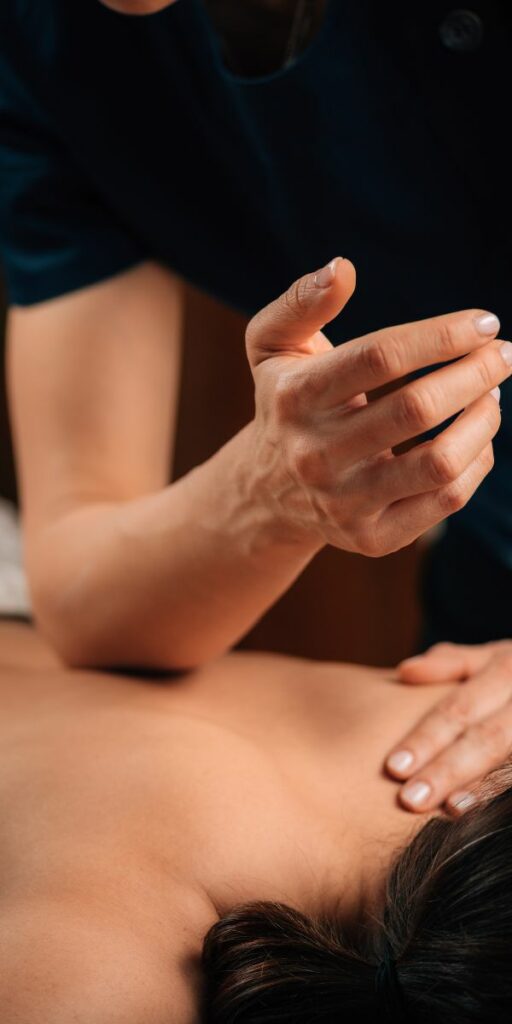
Benefits, Precautions and What to Expect
Deep Tissue Massage
What is Deep Tissue Massage?
A deep tissue massage can be defined as a type of massage that focuses on realigning deeper layers of muscle and connective tissue. It is beneficial for chronically tensed and contracted areas such as stiff necks, low back tightness, or sore shoulders.
Some of the strokes used here are used in traditional massage therapy, but the movement is a bit slower, and the pressure is deeper and concentrated on areas of tension and pain to reach the muscle’s sub-layer and the fascia.
Massage therapists may use their elbows, knuckles, fists, and even feet to achieve deep pressure and very slow strokes. The therapist will now and then check in with you to ensure the pressure remains comfortable while they work to release the knots and adhesions causing your pain.
It should not be too painful – if it does hurt, tell your therapist so they can adjust their pressure accordingly. You will likely feel some stiffness or soreness after your massage session, but this dissipates within a day or so.



Flush out "toxins" ?
Benefits of
deep tissue massage
Deep massage benefits are too numerous to fit in one article. Below are listed just some of the benefits, but keep in mind that each of us will have a different reason for getting a massage and thus a benefit that might be specific to us.
Reduces stress and anxiety
When stressed, our muscles tense up to protect us from potential danger. This "fight or flight" response is meant to be temporary, but if we experience chronic stress, our muscles can stay in this state of constant contraction. This can lead to pain and tension, as well as a host of other problems.
A deep tissue massage helps to release the muscle tension by gradually breaking up the "knots" that have formed. This not only helps to manage stress and anxiety but can also improve circulation and range of motion. In addition, a deep tissue massage can help release endorphins, natural painkillers that can further reduce pain and muscular tension.
Improves your sleep
A deep tissue massage helps improve sleep quality for several reasons. First, it helps to relieve muscle tension. When your muscles are tense, they can interfere with your ability to fall asleep and stay asleep. A deep tissue massage relaxes your muscles, improving your sleep quality. In addition, a deep tissue massage can also help to reduce stress and anxiety.
If you're feeling stressed or anxious, falling asleep and staying asleep can be challenging. A deep tissue massage can help calm your mind and body, making sleeping easier.
Finally, a deep tissue massage can also improve circulation. Poor circulation can lead to restless legs syndrome, making it difficult to sleep. A deep tissue massage can help improve circulation and reduce the symptoms of restless legs syndrome. As a result, a deep tissue massage can profoundly impact your sleep quality.
Lowers the blood pressure
A deep tissue massage can help to lower blood pressure by promoting relaxation and relieving muscle tension. When the muscles are relaxed, the heart doesn't have to work as hard to pump blood, and the blood vessels don't have to constrict as much to carry blood. This can lower your blood pressure.
In addition, a deep tissue massage can also help to relieve stress, which is another contributing factor to high blood pressure. By reducing stress levels, a massage can indirectly help to lower blood pressure.
Reduces inflammation
Inflammation is the way your body reacts to injury or infection. However, when inflammation is continues, it can lead to pain, stiffness, and swelling. Deep tissue massage can be an effective treatment for reducing inflammation.
The therapist applies pressure to the deep muscles and connective tissue, breaking up adhesions and promoting circulation. This helps to reduce pain and improve the range of motion. In addition, deep tissue massage can help reduce the body's production of inflammatory chemicals.
How deep tissue massage works
Most people are familiar with massage, and many have experienced its benefits firsthand. Whether you receive a massage at a spa or from a professional therapist, the goal is always to relax and rejuvenate the body. But how does massage work?
Deep tissue massage is similar to other types of massage, but the techniques used are slightly different. When compared to Swedish massage, which is the most common type of massage, deep tissue massage uses slower strokes and more pressure. The therapist will also use their elbows, forearms, and knuckles to reach deep into the muscle tissue. Besides, deep tissue massage also incorporates stretching and rocking motions.
While there is no definitive answer regarding how often one should get a deep tissue massage, most experts recommend receiving one every four to six weeks. This gives the body ample time to recover from each session and maintain the benefits of massage. If you are experiencing chronic pain or tightness, however, you may need more frequent treatments. Your therapist can help you determine the best schedule for your needs.

Potential risks
and side effects of deep tissue massage
It can sometimes cause bruising
Sometimes, deep tissue massage can cause bruising. This is usually the result of too much pressure being applied to the muscles. If you experience bruising after a massage, it should dissipate within a day or two.
It can lead to soreness in the muscles
At times, deep tissue massage can lead to soreness in the muscles. This is usually the result of lactic acid buildup in the muscles, and it should dissipate within a day or two. However, if you experience more than 48 hours of muscle soreness, you should consult your doctor.
Can cause dizziness
Finally, deep tissue massage can sometimes cause dizziness. This is usually the result of the body becoming too relaxed. If you experience dizziness, it will typically resolve within a few minutes.
Where to find deep tissue massage in Chiang Mai
If you’re in Chiang Mai and looking for a deep tissue massage, there are a few places you can go. They include:

Thai Traditional and Complementary Medicine Center
Thai Traditional and Complementary Medicine Center is an non-profit agency and a perfect place to visit if you're looking to have a proper deep tissue massage. Their focus is on the medicinal benefits of massages where you will consult with their doctor before having a massage.

